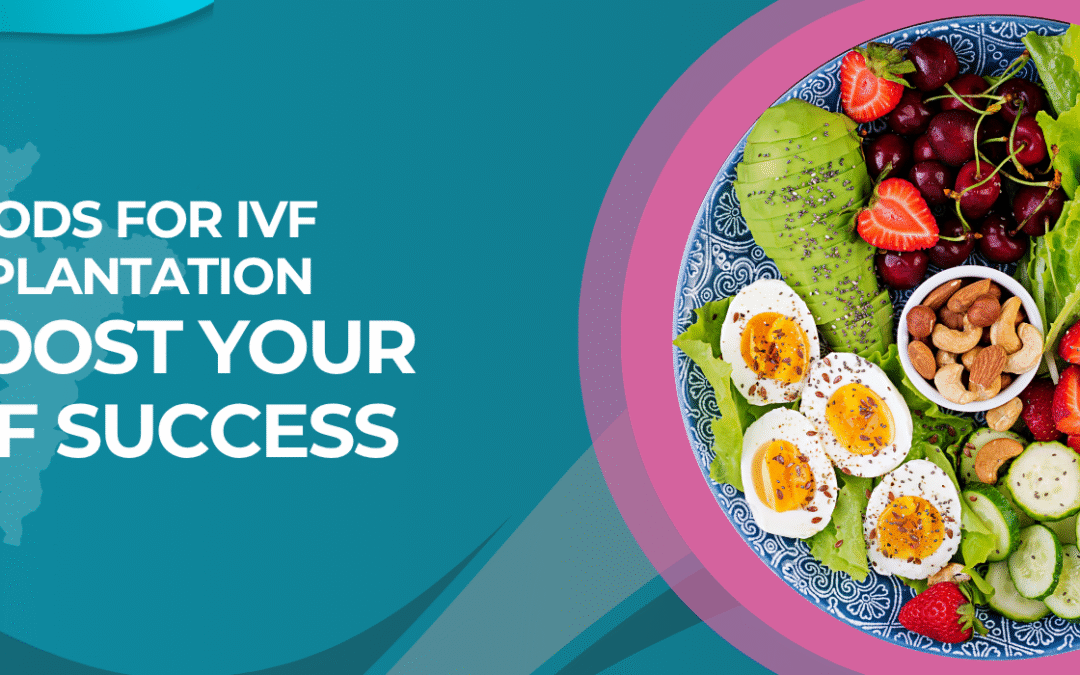The process of in vitro fertilization (IVF) is a medical procedure intended for patients, individuals, or couples who desire to get pregnant but have experienced infertility. IVF is when an egg is fertilized outside the body and transferred/implanted into the uterus. But the process doesn’t just end after implantation takes place; reproductive nutrition is important for consideration to lead to a successful pregnancy. The time period after the IVF embryo transfer is critical in the process of a functional pregnancy that considers the needed environment for embryo implantation (and its growth) following transfer. The actual nutrition you consume during this early implantation phase of pregnancy can have a significant impact on how successful the implantation was, as well as the early stages of your pregnancy. Dr. Nisarg Patel, an established IVF doctor in Ahmedabad, states that a nutritious and well-balanced diet is vital to patients undergoing an IVF treatment cycle.

“Eating the right type of food after the IVF embryo transfer can have a vital impact on a successful pregnancy,” Dr. Patel states.
Hence, it is important to take nutrition into account when eating for successful IVF implantation. At Nisha IVF Centre in Ahmedabad, we take nutrition seriously when working with our patients during the process of IVF. Nisha IVF, led by Dr. Nisarg Patel, provides a terrific composed and educated care team and is known for its individualized care and contemporary treatments.
How Nutrition Supports IVF Implantation?
Nutritional status is an extremely important aspect when it comes to IVF implantation. After egg retrieval and fertilization occurs, the embryo will need an environment that will protect and nourish it until implantation happens in the uterus. Nutrition will provide for that nurturing uterine environment by providing blood flow, hormonal regulation, and overall reproductive health. An IVF fertility diet would assist in making improvements in hormone balance, egg quality, and thickness of the endometrial lining for supporting a successful pregnancy.

Nourishing the body with healthy, nutritious foods will allow your body to ensure the vitamins, minerals, and nutrients are sufficient to support a successful and healthy pregnancy. Nutrition becomes an important variable during IVF since certain foods are considered to be anti-inflammatory and certain foods are recognized to be antioxidant-rich, both promoting fertility. Hydration and weight management are additional factors that also contribute to the success of IVF.
Fertility-Friendly Foods for IVF Implantation
A well-balanced diet for IVF implantation is crucial. Below are some foods that support your fertility and may help increase the chances of successful implantation.
- Leafy Greens

Examples: Spinach, kale, arugula, collard greens.
Benefit: Leafy greens are rich in folate, an essential vitamin for reproductive health. Folate aids in the development of the fetus and the early stages of pregnancy. They are also high in iron and calcium, which are essential for uterine health.
- Protein Power Foods

Examples: Eggs, chicken, tofu, lentils, chickpeas.
Benefit: Protein is vital for the development of the embryo and for maintaining healthy hormone levels during IVF treatment. Adequate protein intake supports egg quality and promotes a strong uterine lining, increasing the chances of implantation.
- Healthy Fats

Examples: Avocados, nuts, seeds, olive oil.
Benefit: Healthy fats, particularly omega-3 fatty acids, are important for hormone production and improving blood flow to the uterus. They help reduce inflammation and support overall fertility, providing an ideal environment for embryo implantation.
- Whole Grains

Examples: Brown rice, quinoa, oats, whole wheat bread.
Benefit: Whole grains provide essential fiber, which helps maintain blood sugar levels and promotes a healthy weight. They are also rich in B vitamins, which are crucial for fertility and the development of the fetus.
- Fruits for IVF Implantation

Examples: Berries, oranges, pomegranates, bananas.
Benefit: Fruits are rich in vitamins, antioxidants, and fiber, which support reproductive health. Vitamin C in fruits helps in the absorption of iron and boosts immune function, while antioxidants help protect the eggs from oxidative stress.
- Dairy Products

Examples: Milk, yogurt, cheese.
Benefit: Dairy products are high in calcium, which is important for bone health and overall development during pregnancy. Additionally, dairy contains vitamin D, which supports egg quality and implantation.
- Iron-Rich Foods

Examples: Lentils, spinach, red meat, beans.
Benefit: Iron helps prevent anemia and supports overall blood health, which is essential for a successful pregnancy. Iron-rich foods help nourish the uterine lining and support healthy blood flow during implantation.
- Hydrating Drinks

Examples: Water, coconut water, herbal teas (ginger, peppermint).
Benefit: Staying hydrated is crucial for maintaining healthy cervical mucus, which is important for conception and implantation. Hydration helps in the transport of nutrients to the embryo and promotes overall health.
Sample Diet Chart for IVF Implantation
| Meal | Time | Recommended Foods | Why It’s Beneficial |
| Morning (Empty Stomach) | 6:30 – 7:00 AM | – 1 glass warm water with lemon OR coconut water – 5 soaked almonds + 2 walnuts | Boosts hydration, metabolism & supplies healthy fats |
| Breakfast | 8:00 – 9:00 AM | – Moong dal chilla with mint chutney – 1 boiled egg or paneer slice – 1 glass low-fat milk | High in protein, calcium, folate & fiber |
| Mid-Morning Snack | 11:00 AM | – 1 bowl apple or pomegranate – 1 cup green tea or lemon water | Rich in antioxidants, vitamin C, supports uterine lining |
| Lunch | 1:00 – 2:00 PM | – 1 bowl brown rice or phulka (2) – Mixed dal or rajma – Palak or methi sabzi – Salad | Provides iron, fiber, plant-based protein, and folate |
| Afternoon Snack | 4:00 PM | – 1 banana or handful of roasted makhana – Herbal tea (caffeine-free) | Energy boost and supports digestion |
| Evening Snack | 6:00 PM | – 1 bowl curd with flaxseeds or chia seeds | Probiotics + omega-3s support hormonal balance |
| Dinner | 7:30 – 8:30 PM | – Quinoa or millets khichdi with vegetables – Soup (spinach/tomato) – Steamed paneer or tofu | Light, nutritious meal rich in iron, protein & antioxidants |
| Post-Dinner | 9:00 – 9:30 PM | – Warm turmeric milk OR chamomile tea (caffeine-free) | Helps relaxation, reduces inflammation, promotes restful sleep |
Foods to Avoid After IVF Transfer
Several types of foods could negatively affect the process of implantation or may be harmful in the IVF process. It’s also best to avoid the following foods after embryo transfer:
- Caffeine:

As with other factors we recommend avoiding, caffeine can negatively affect someone’s fertility, and could potentially have less than positive effects on the implantation process. It is best to avoid or limit the consumption of coffee, tea, and any caffeine in general.
- Processed Foods:

Processed foods, especially those containing sugar and/or highly processed could lead to an inflammatory process and possibly disrupt hormonal regulation and hormonal balance negatively effecting implantation.
- Raw Fish and Seafood:

Specifically uncooked fish/seafare and uncooked/cooked sushi could contain bacteria and/or parasites that could be harmful to your health
- Alcohol:

Alcohol can effect fertility negatively, as it should always be avoided during the IVF process.
Alcohol is also typically discourage after the embryo transfer process for better success chances for implantation.
Stay away from these foods for optimal IVF implantation success.
Lifestyle Tips Along With Diet
A healthy lifestyle is equally as important as your diet during IVF implantation, if not more so. Here are some lifestyle recommendations to consider in addition to all of the foods you’ve been recommended:
- Exercise Regularly:
Regular moderate – exercise helps improve blood flow, balances hormones and contributes overall health.
- Stress Management:

Stress is not good for fertility. Engage in practices, such as, yoga, meditation, and breath work that help manage stress.
- Adequate Sleep:

Getting adequate sleep is equally important and has a positive impact on hormones, and reproductive health.
If you implement these lifestyle recommendations there is a good likelihood you are setting yourself up for success with IVF.
Conclusion
Eating the appropriate foods for embryo implantation, as well as creating an environment for a healthy gestational process for implantation, will certainly have one of the most important aspects of your success – successful embryo transfer. By choosing healthy, balanced well meal plans to include appropriate fertility foods, you will likely or try to enhance the chances of improvement to the implant success and early pregnancy.
In addition to eating the proper foods, a healthy lifestyle also is important to fertility. And, during the IVF egg retrieval process, you should make sure to have partnered with experienced IVF doctor, like Dr. Nisarg Patel to develop a personalized plan that supports your fertility journey.
Conclusion
IVF bleeding can be alarming, yet understanding why and when to seek medical care can make a big difference in your IVF cycle. From spotting implantation bleeding to a severe issue, being aware of your symptoms and open communication with your IVF doctor is essential.
At Nisha IVF Centre in Ahmedabad, Dr. Nisarg Patel and team are dedicated to providing you with the complete spectrum of care and support along the journey with your IVF. With adequate guidance, you can get over any troubles and go ahead confidently.
Frequently Asked Questions
Which Indian foods are best for IVF implantation?
Can I eat dry fruits after IVF transfer?
Is it safe to eat fish after IVF transfer?
Should I eat pineapple core for implantation?
Can spicy food or oily food affect IVF implantation?
Is it safe to fast after IVF transfer?
How much water should I drink after IVF transfer?
Reference Links:
https://www.healthline.com/health/guide-prepare-for-ivf
https://parenting.firstcry.com/articles/ivf-diet-tips-to-increase-your-chances-of-success/
Disclaimer: The information shared in this content is for educational purposes and not for promotional use.


